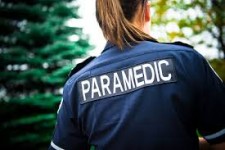PROFESSIONAL QUALIFICATIONS
There are numerous entry levels into the Emergency Medical Care field. However, in order to work as a registered Emergency Care Practitioner on an ambulance an individual should be at least qualified as a Basic Ambulance Assistant and registered with the Health Professions Council of South Africa (HPCSA).
Qualifications accepted in the Emergency Medical Care field are:
- Basic Ambulance Assistant (BAA) / Basic Life Support (BLS)
- Ambulance Emergency Assistant (AEA) / Intermediate Life Support (ILS)
- Critical Care Assistant (CCA) / Advanced Life Support (ALS)
- NDip. Emergency Medical Care / Advanced Life Support (ALS) Course now changed to BTech. Emergency Medical Care
- BTech. Emergency Medical Care / Advanced Life Support (ALS)
- Other Emergency Medical Care qualifications registered with the HPCSA.
OTHER PROFESSIONAL MEDICAL COURSES
- BLS for Healthcare Providers: The BLS Healthcare Provider Course teaches the skills of CPR for victims of all ages (including ventilation with a barrier device, a bag-valve-mask device, and oxygen), use of an AED, and relief of a Foreign Body Airway Obstruction. The course is designed for healthcare providers who care for patients in a wide variety of settings, both in and out of hospital.
- Professional Rescuer CPR: Specifically designed for health care professionals, paramedic, including allied health workers, nurses and physicians, this robust training programme teaches the knowledge and skills necessary to recognise and treat life-threatening respiratory and cardiac emergencies.
- ACLS (Advanced Cardiac Life Support) for EMT-B (Basics): The EMTBasic can find themselves in critical situations that require advanced cardiac life support (ACLS). Although EMT-Basics are not trained to provide advanced-level skills, there is much they can do to improve the quality of management and the patient’s chance for survival by understanding ACLS and facilitating its administration by ALS providers. ACLS for EMT-Basics familiarises the reader with cardiac emergencies and the skills used to manage them.
- Paediatric Education for Pre-Hospital Providers (PEPP): represents a comprehensive source of pre-hospital medical information for the emergency care of infants and children. PEPP is designed to give pre-hospital professionals the education, skills, and confidence they need to effectively treat paediatric patients. Developed by the American Academy of Paediatrics, PEPP specifically teaches prehospital professionals how to better access and manage ill or injured children. PEPP combines complete medical content with dynamic features and an interactive course to better prepare pre-hospital professionals for the field. The one-day BLS course is geared towards First Responders and EMT-Basics, while the two-day ALS course is for EMT-Intermediate and Paramedic providers.
For more information on training, email the ER24 Training Academy on [email protected] or visit the ER24 Training Academy page
